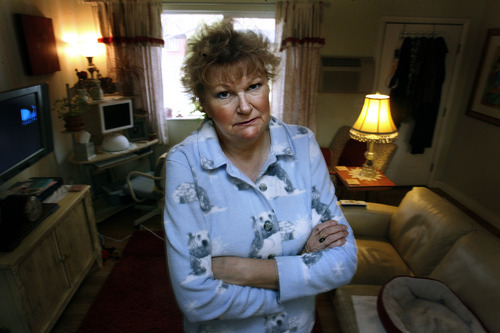This is an archived article that was published on sltrib.com in 2011, and information in the article may be outdated. It is provided only for personal research purposes and may not be reprinted.
Annette Wright minces no words when asked about the prospect of having to do community service for her Medicaid coverage.
It's "crazy" and "demeaning," because it presumes people on the low-income health care program don't already give back, said the 54-year-old career actress. "Volunteering should come from the heart. It's something you do because you want to, not because you have to. What they're doing is more like coercion."
Such was the prevailing sentiment Thursday at a public hearing on an experiment that, if approved by the federal government, would require fewer than 100 Medicaid recipients to do charity work in exchange for health insurance. The pilot program is meant to build a sense of community, not punish the poor, said its architect, Rep. Ronda Menlove, R-Garland.
"A participant will feel more involved," says a blueprint proposal. "The spirit of entitlement will be lessened; less of a handout and more of an earning."
But working adults targeted to participate — those on a bare-bones form of Medicaid called the Primary Care Network (PCN) — say it sends the opposite message.
"It stigmatizes you as being a different class of volunteer. It's like, 'Oh, they have to be here because they're too poor to have health insurance,' " said Karlene Kidman, 52, of Layton.
And it's not practical, she said. "When I was on PCN, I was a single working mom. I would have had to hire a baby sitter to volunteer. This will take moms away from families."
It has been two years since Kidman was on PCN. She earns too much to qualify now as director of the Layton Youth Court, a nonprofit diversion program for first-time juvenile offenders.
The job doesn't carry health benefits, leaving her uninsured. Still, with her kids now grown she finds time to give back as coordinator of a coalition of charities working with at-risk youth.
Wright, too, volunteers as a runner and ticket taker for the Salt Lake Film Society when she isn't performing or managing the house at Salt Lake Acting Company (SLAC).
A familiar face at SLAC, she's starred in just under a dozen shows there since 1991 and picks up odd movie gigs.
She used to get health coverage through the Actors' Equity Association. But the labor union upped the prerequisite from 10 to 20 weeks of work, which is hard to come by in a town with half a dozen theaters. "You would have to do three or four shows," said Wright, who has been acting since high school and has a theater education degree from Brigham Young University.
Not the portrait of a "lazy, staying-at-home playing video games" loafer, said Miriam Hyde, chairwoman of the Utah Democratic Party Disability Caucus. Hyde, who was at the hearing, concedes there is value to service, but argued it should be voluntary.
The pilot project isn't supposed to be a punishment. But since court-ordered compulsory service is used for those who break the law, "how can this be construed as anything but?" she asked.
Details, such as the type and amount of service to be required, have yet to be worked out. But it may not matter: Advocates for the poor predict federal approval, if granted, will come too late.
Federal rules permit states to tinker with programs like PCN, which caters to working poor Utahns whose employers don't offer health benefits. To qualify, a single person must earn less than $16,335 annually.
But vetting waiver requests can take months or years. And come 2014, PCN will have dissolved. That year, under federal health reform, PCN clients will qualify for federal subsidies to purchase coverage in health marketplaces known as exchanges. —
More online
O Read a blueprint of the experiment that would require community service of Medicaid recipients



